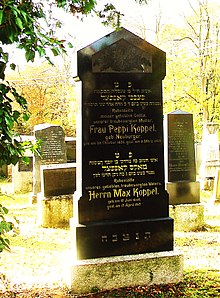Max Koppel
Max Koppel (born June 17, 1840 in Kleinerdlingen , † April 17, 1917 in Nördlingen ) was the son of master glazier Josef Koppel (died 1874). In 1897 he founded with his sons Emil Koppel (1872-1941) and David Koppel (1873-1934), the major syenite - granite - and marble -Werke Max Koppel & Sons and for this purpose established a still largely preserved factory building of brick before Löpsinger Gate with its own siding to the Württemberg or Bavarian State Railways .
The factory was designed by the city's civil engineer Max Gaab , who was already the architect of the imposing synagogue (Nördlingen) that was inaugurated in 1866 . The enormous extent of Koppel's marble work is shown in a lithograph by Wilhelm Zeitraeg from 1911, which was used as the company's letterhead. In 1905, Koppel opened a branch in Munich very close to the old Jewish cemetery .
The range of products offered by the factories included complete shop fittings (e.g. for hairdressers), tabletops for restaurants, stairs, equipment for the construction industry and wall cladding of all kinds and high-quality gravestones, mostly made of black syenite. Of these, 135 copies have been preserved in the Jewish cemetery in Augsburg alone , over thirty in Munich, and beyond. a. in Nuremberg, Stuttgart or Ingolstadt, but also in the princely crypt of the House of Oettingen-Spielberg in Oettingen .
The plant for monumental buildings, construction and furniture work also benefited from the building boom from the early days to the First World War and with up to 60 workers temporarily formed the second largest business enterprise and employer in Nördlingen. "Max Koppel & Söhne" was also valued by the Bavarian royal family and won effective promotional medals at trade exhibitions, such as in 1906 in Nuremberg on the occasion of the centenary of the Kingdom of Bavaria . In 1913 the company in Leipzig was also awarded the prestigious State Prize of the Kingdom of Saxony , which underlines the supra-regional reputation of the company.
Further development of the company after Max Koppel's death
The First World War marked the first turning point. The company founder Max Koppel died in 1917 and was buried in the Jewish cemetery in Nördlingen , while his son David took part in the war as a soldier and was taken prisoner by the British in 1918, from which he only returned two years later. But workers at the company were also captured or fell. The economic crises that followed after the war also made themselves felt in the natural stone industry, especially since the production of artificial stone had created cheaper competition. After the death of David Koppel in the spring of 1934, the inevitable end of the business activities of the Koppel company became apparent, especially since his widow and her sons in the Nazi and anti-Semitic German Reich saw no future for a Jewish business and also saw the sale of the property its structures crowded. In 1935 there was therefore a foreclosure auction. Emil Koppel died lonely and bitter on November 23, 1941, which at least saved him from deportation.
Today, the largely preserved structures of "Max Koppel & Söhne" are reminiscent of a natural stone company that was once recognized across the region and the most important manufacturer of Jewish gravestones in southern Germany. After 1935 the shoe factory "Steinacker & Hartmann" was housed on the company premises, from 2010 to 2012 Nico Jilka's drama factory was temporarily housed here. Current plans include residential development while retaining the historic factory architecture.
literature
- Rolf Hofmann, encounters with remarkable people, life pictures of Jewish personalities of yore , booklet for the exhibition as part of the "Rieser Kulturtage 2010"
- Dietmar Voges, Nördlingen since the Reformation, from the life of a city , Munich 1998, p. 358 u. 373
- Rolf Hofmann, Max Koppel & Sons, Jewish stonemason company in Nördlingen - Max Koppel & Sons - Jewish Stonemasons in Nördlingen (Bavaria) , German + English, Kokavim-Verlag (2013), ISBN 978-3-944092-10-2 ; 2nd edition: Steinmeier, Deiningen, February 2017: ISBN 978-3-943599-56-5
Web links
- http://www.alemannia-judaica.de/images/Images%20329/ND-MAX-KOPPEL-UND-SOEHNE.pdf
- http://www.alemannia-judaica.de/images/Images%20329/ND-MAX-KOPPEL-AND-SONS.pdf
- http://www.augsburger-allgemeine.de/noerdlingen/Ein-fast-vergessener-Unternehmer-id20180491.html
| personal data | |
|---|---|
| SURNAME | Coupling, max |
| ALTERNATIVE NAMES | Koppel, Max Mordechai |
| BRIEF DESCRIPTION | Jewish-German entrepreneur |
| DATE OF BIRTH | June 17, 1840 |
| PLACE OF BIRTH | Little things |
| DATE OF DEATH | April 17, 1917 |
| Place of death | Nordlingen |

